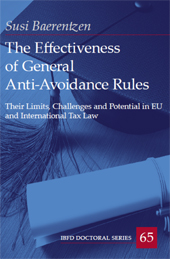The Effectiveness of General Anti-Avoidance Rules : their Limits, Challenges and Potential in EU and International Tax Law
xv, 301 p.
Includes bibliographical references.
General anti-avoidance rules have attracted much attention following their widespread introduction in both the European Union and the OECD, but the question is whether the rules are effective at achieving what they are intended to do. This book introduces a novel way of assessing the legal and economic impact of the general anti-avoidance rules (GAARs) introduced throughout the European Union and the OECD. The book builds on fundamental legal and economic theory and provides a groundbreaking interdisciplinary tax law and economics method for assessing the impact of the GAAR provided by the EU Anti-Tax Avoidance Directive, as well as the principal purposes test (PPT) introduced with the BEPS Project.
By viewing the global network of international tax treaties as a joint network with multiple facets defined by the domestic tax rules of the participating states, the book uses legal and economic network theory to assess the impact of limiting the taxpayers' choices for tax planning and treaty shopping introduced by the ATAD GAAR and the BEPS PPT . Four different sample countries (Australia, Denmark, France and Germany) are used to assess the impact in light of specific domestic tax legislation in states with different specifications: some with a long-standing history of using GAARs, some that are new to the rules, some that are EU Member States, some that are OECD member countries, and all with different legal constitutional systems.
These impact assessments and legal analyses are applied in order to determine whether the use of GAARs within the European Union and the OECD is actually achieving what is intended, namely (i) from an economic perspective, that the rules contribute to tax income where it is created; and (ii) from a legal perspective, to prevent tax avoidance and ensure harmonization between the states in these matters. [Publisher's text]
Thesis.
Special access authorizations may apply; please contact us for further information.
739024 characters
-
Información
ISBN: 9789087227951
COLECCIÓN



 EPUB
EPUB